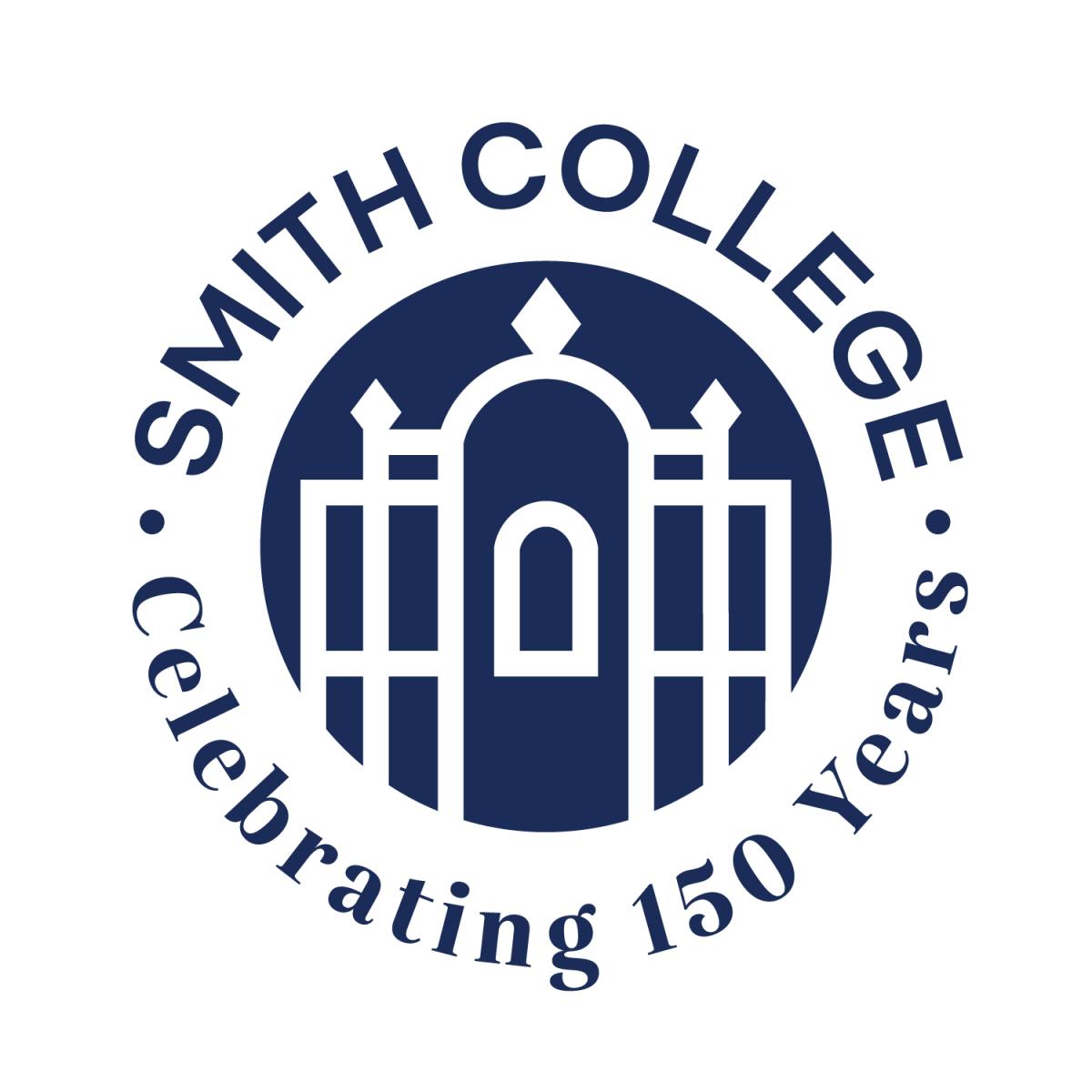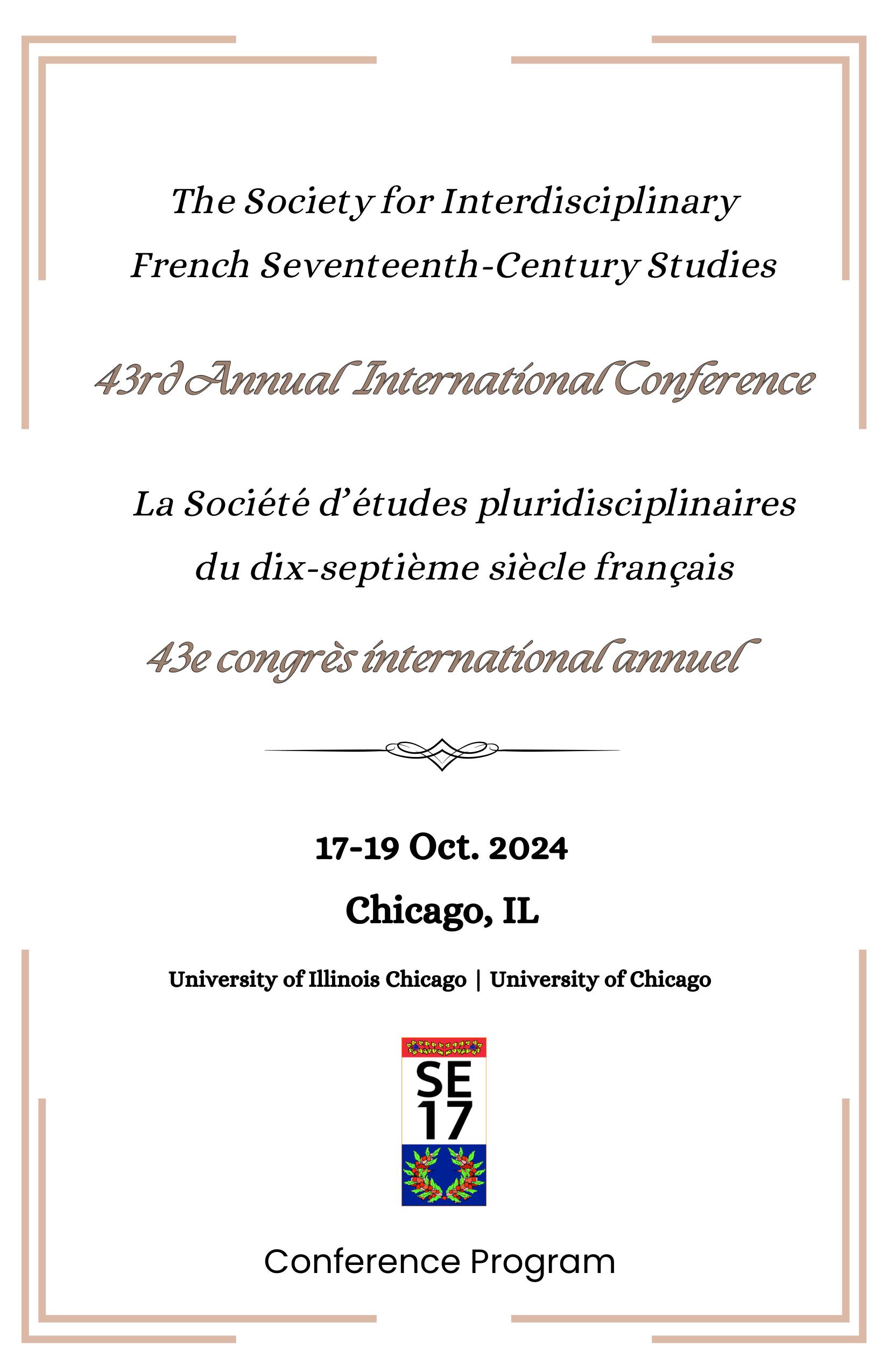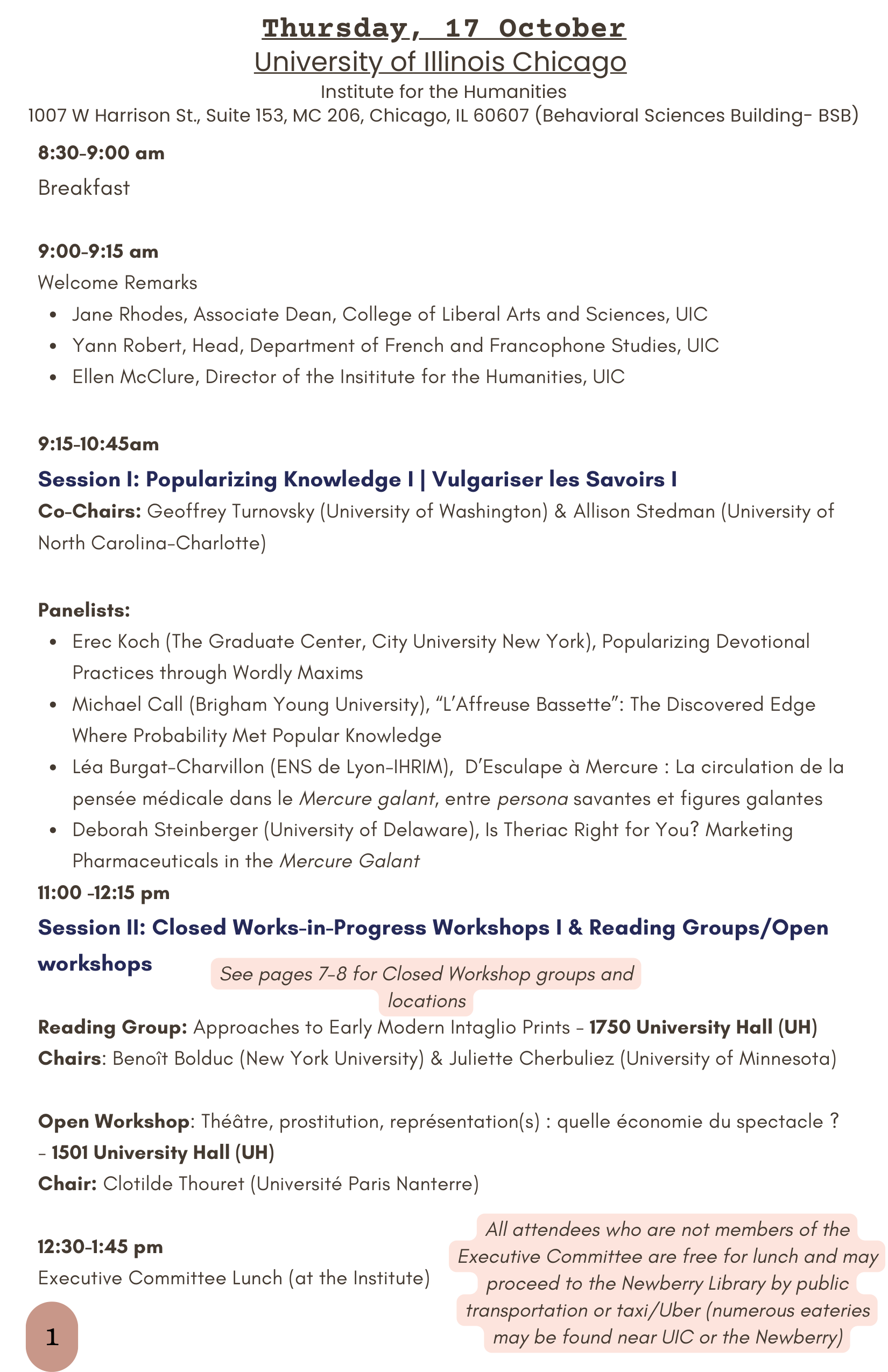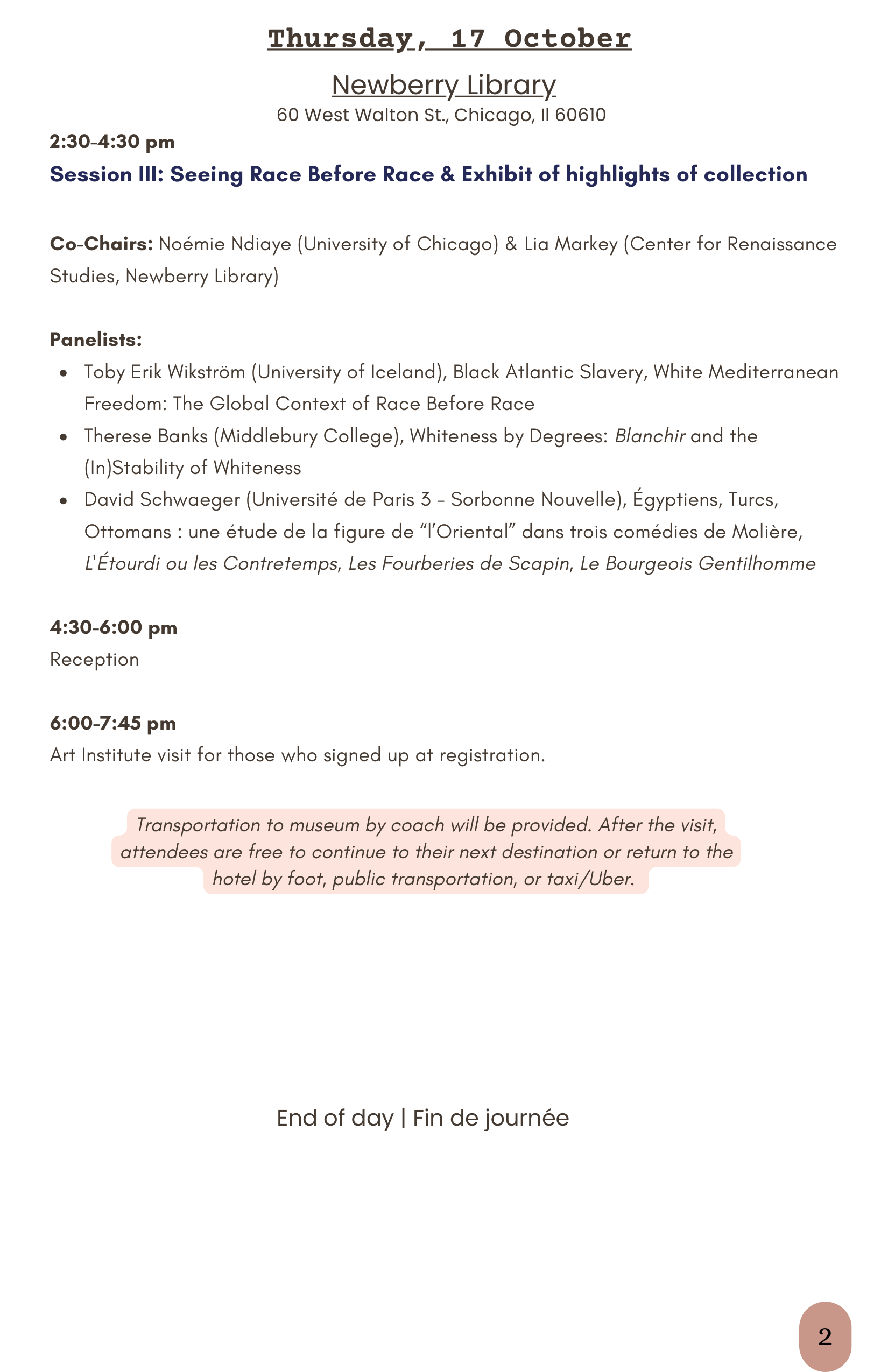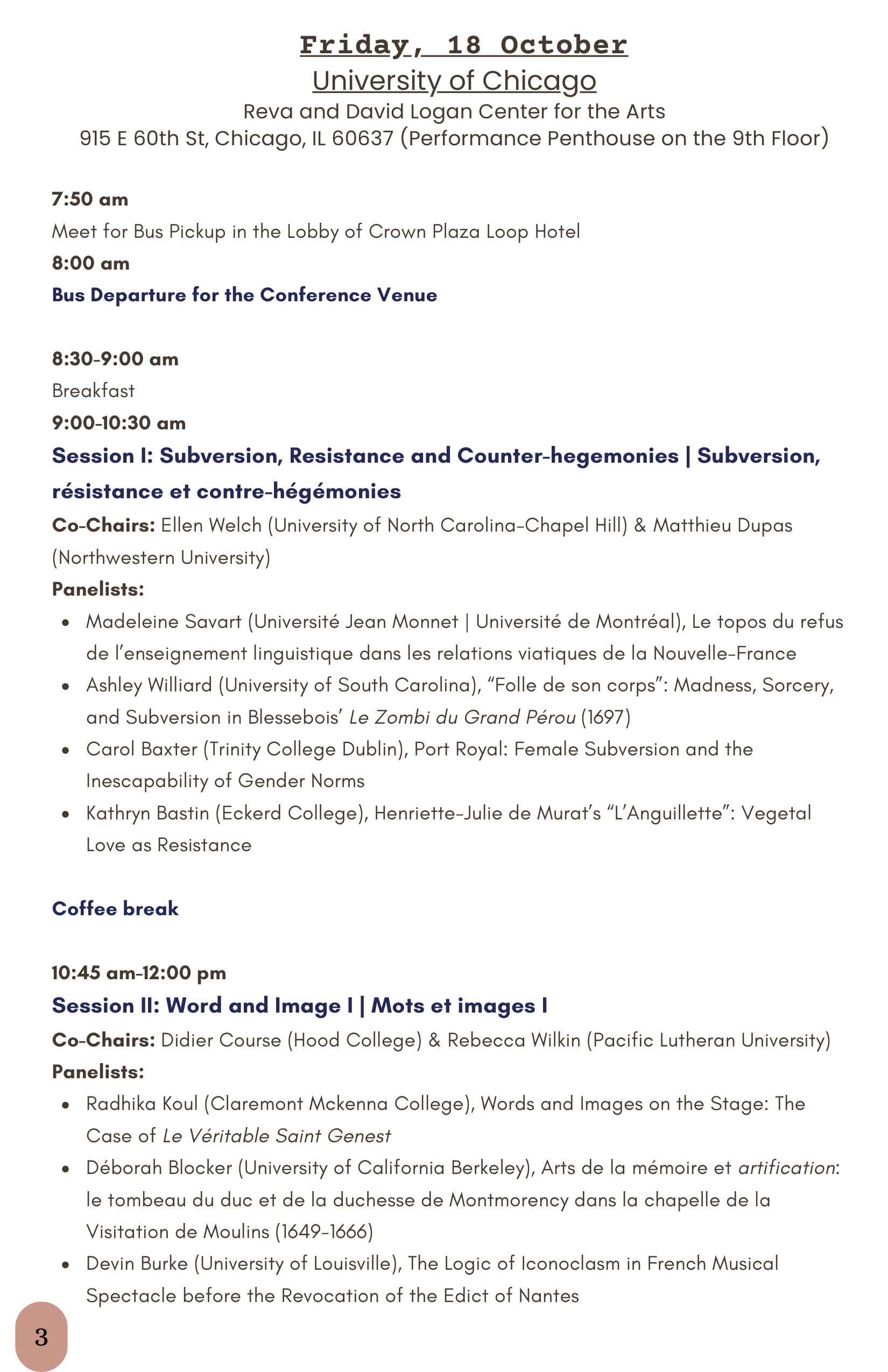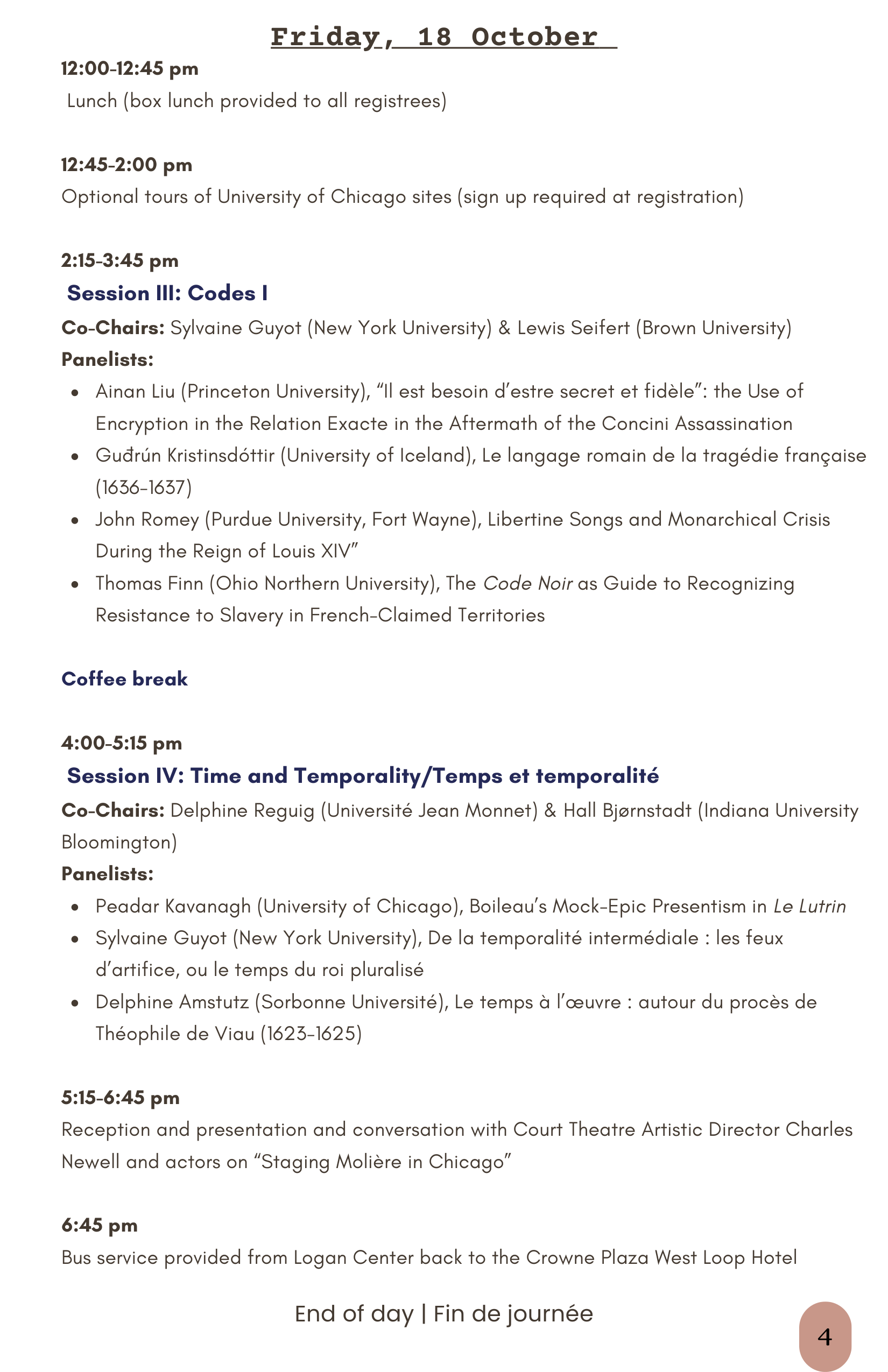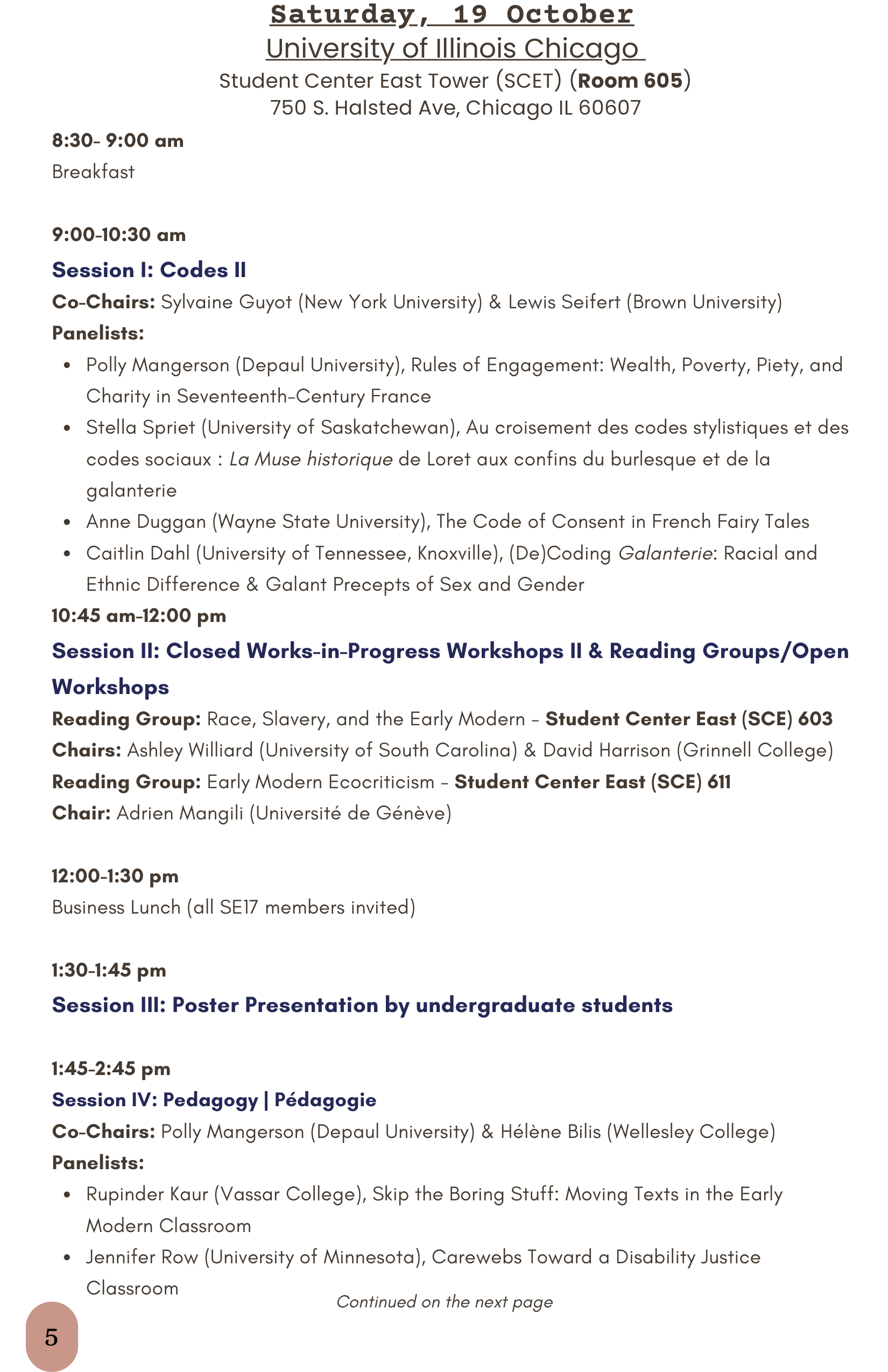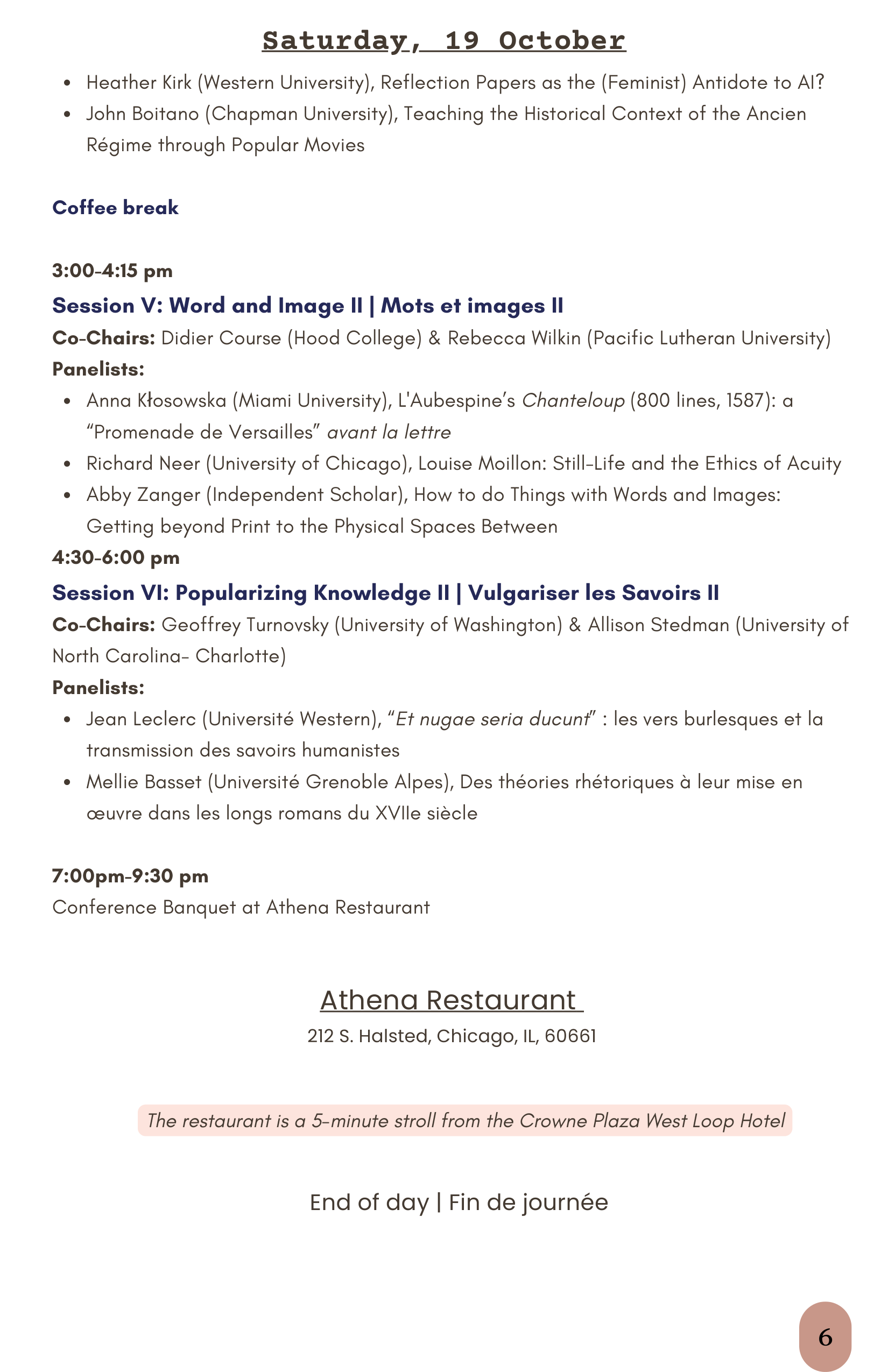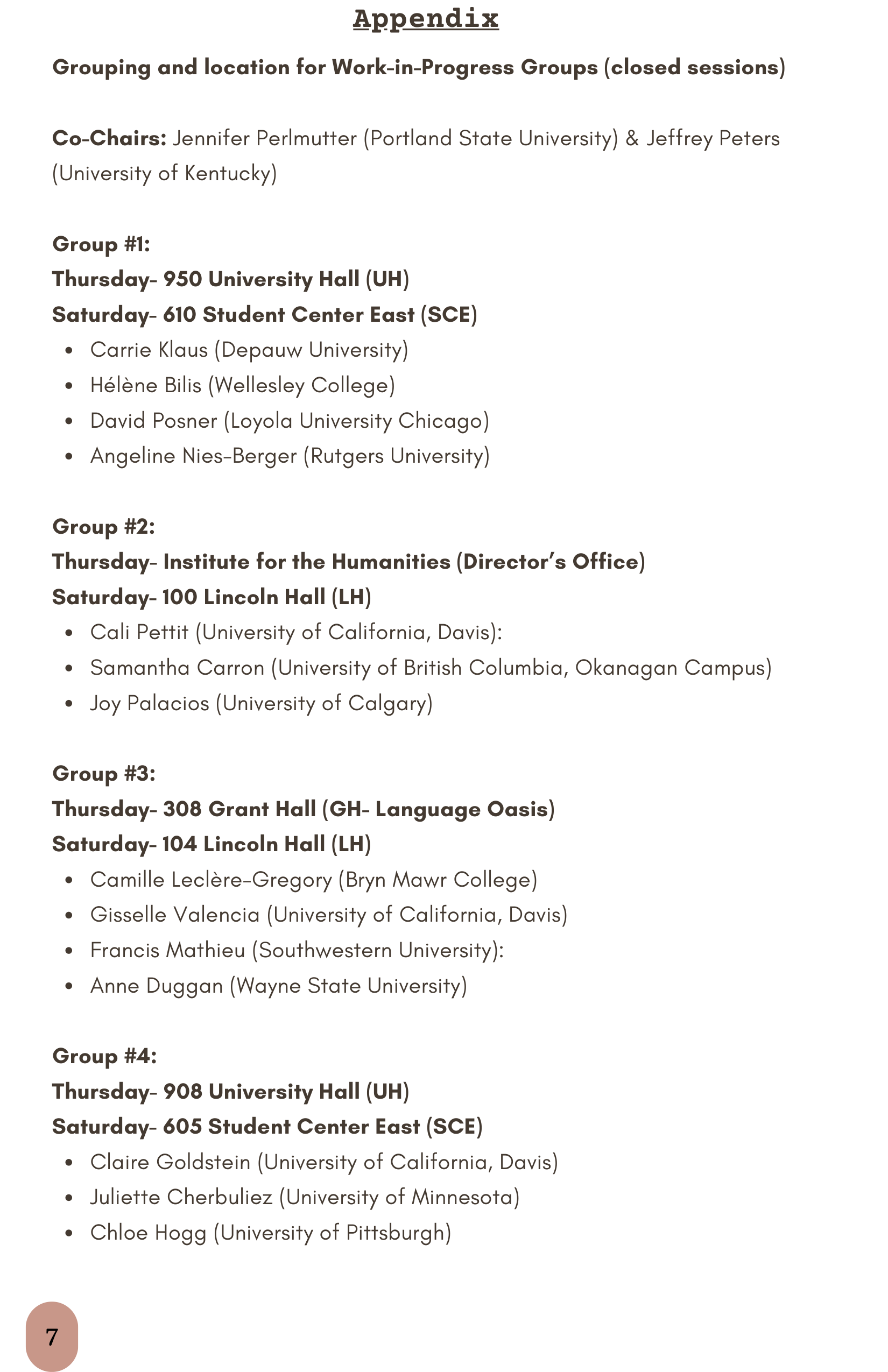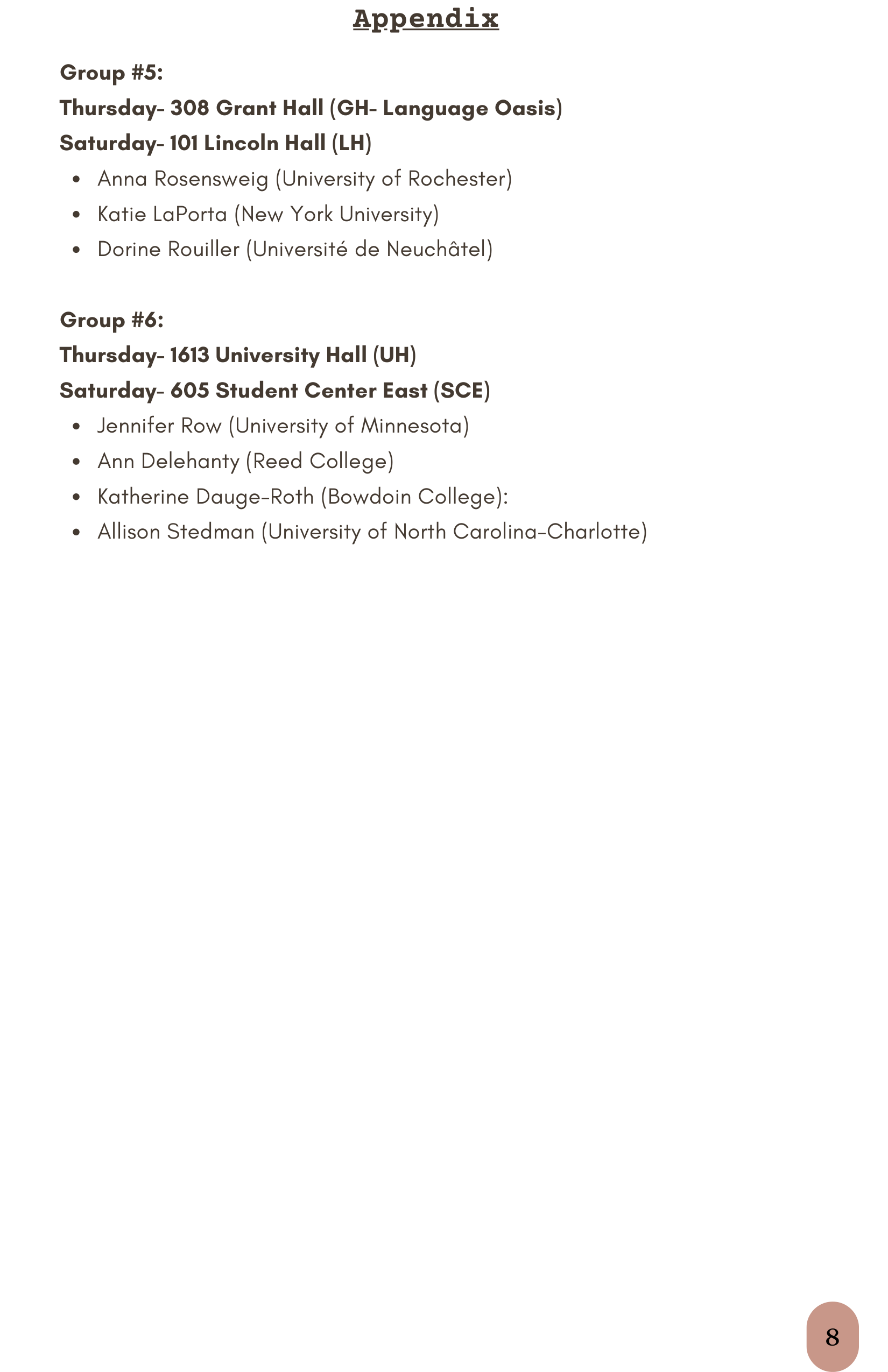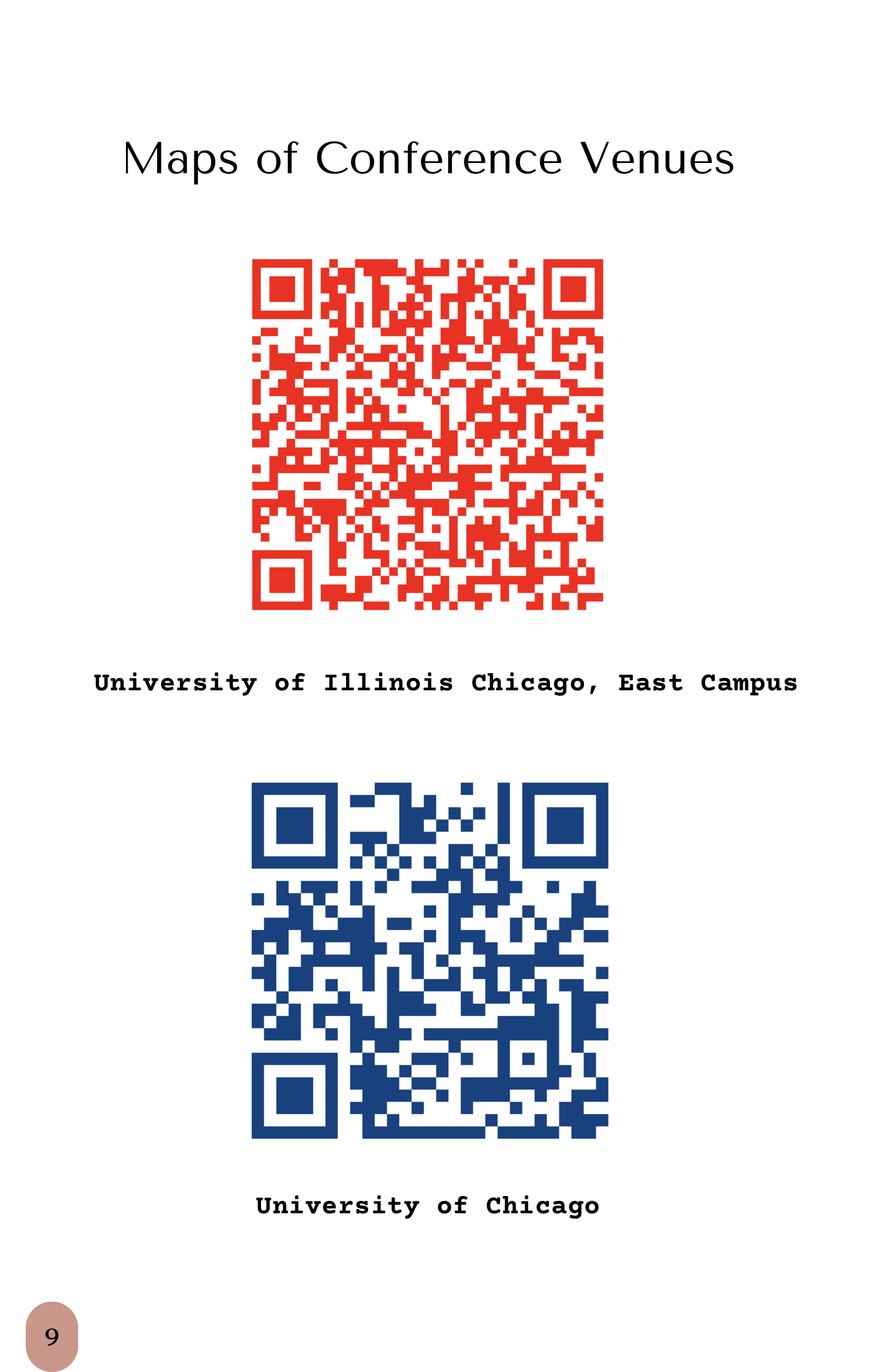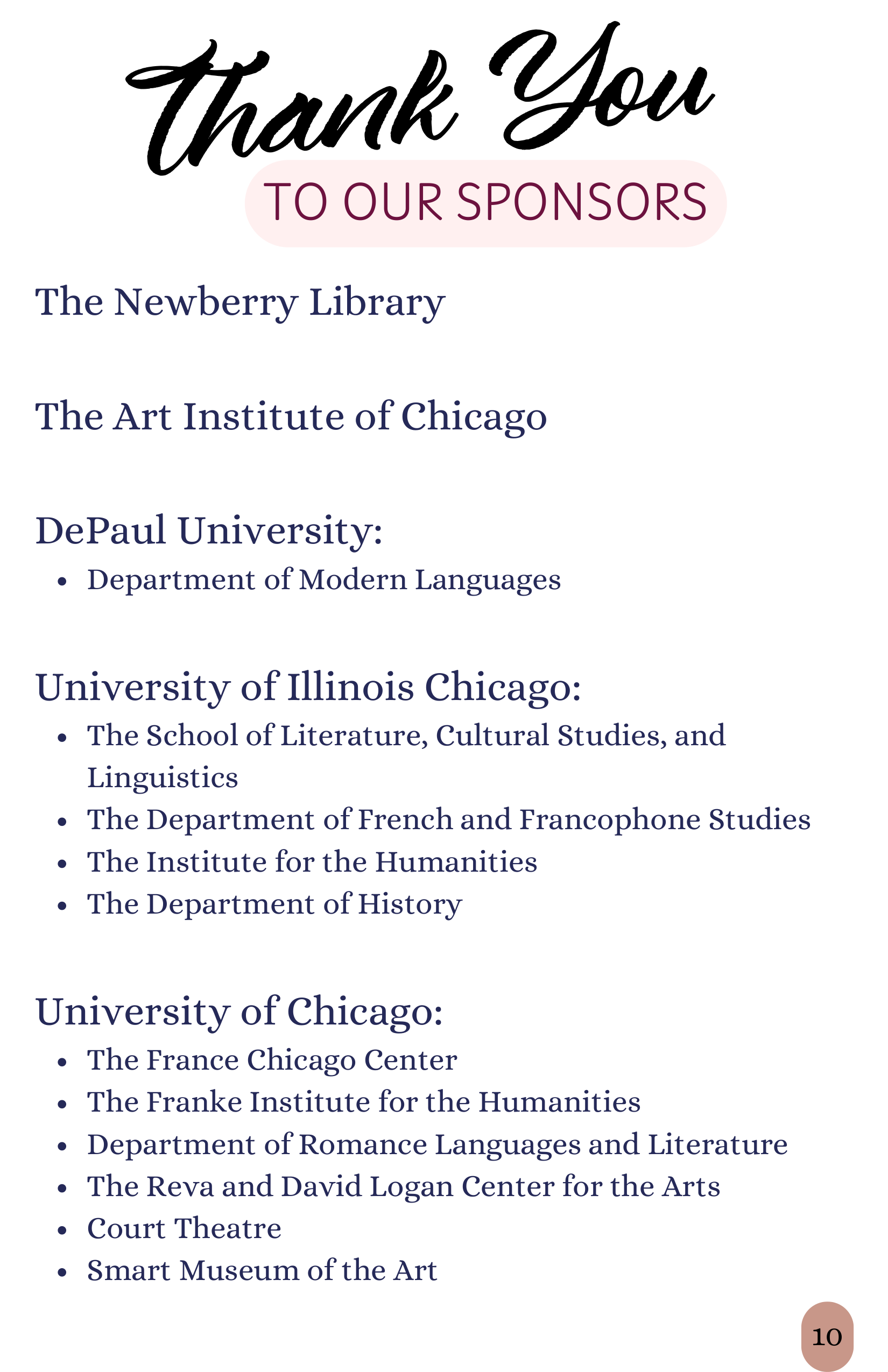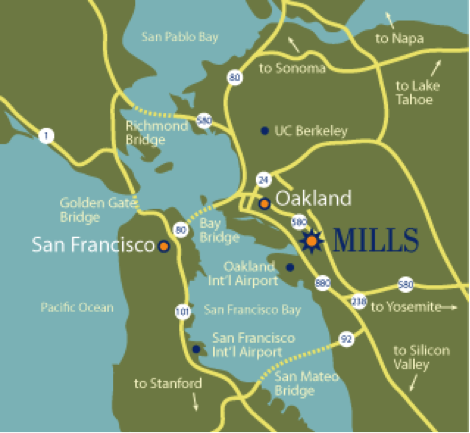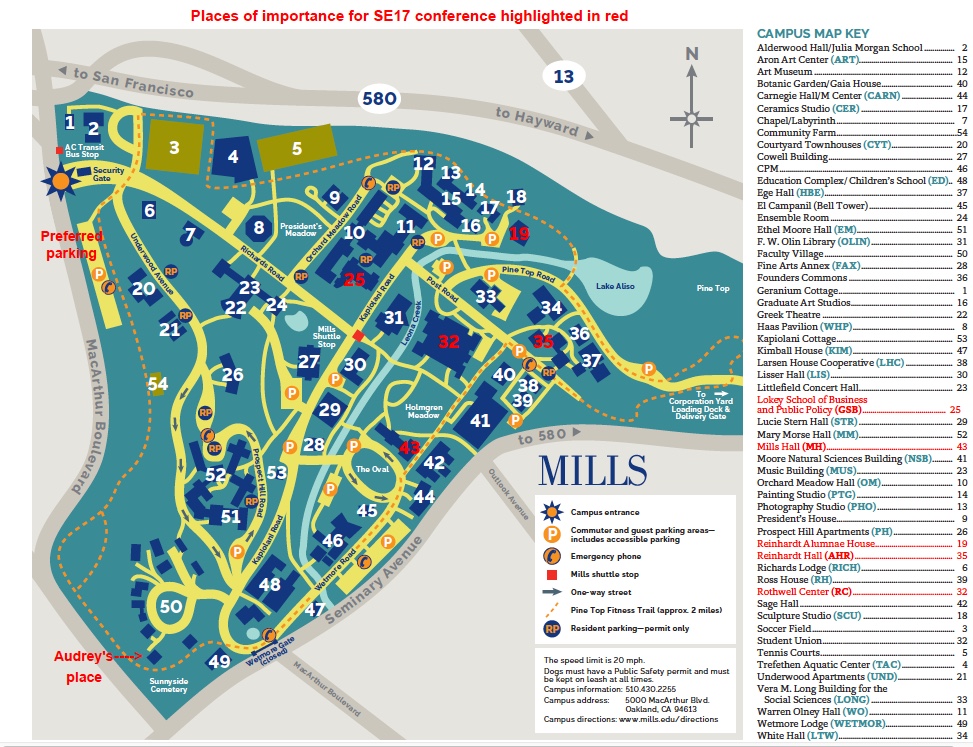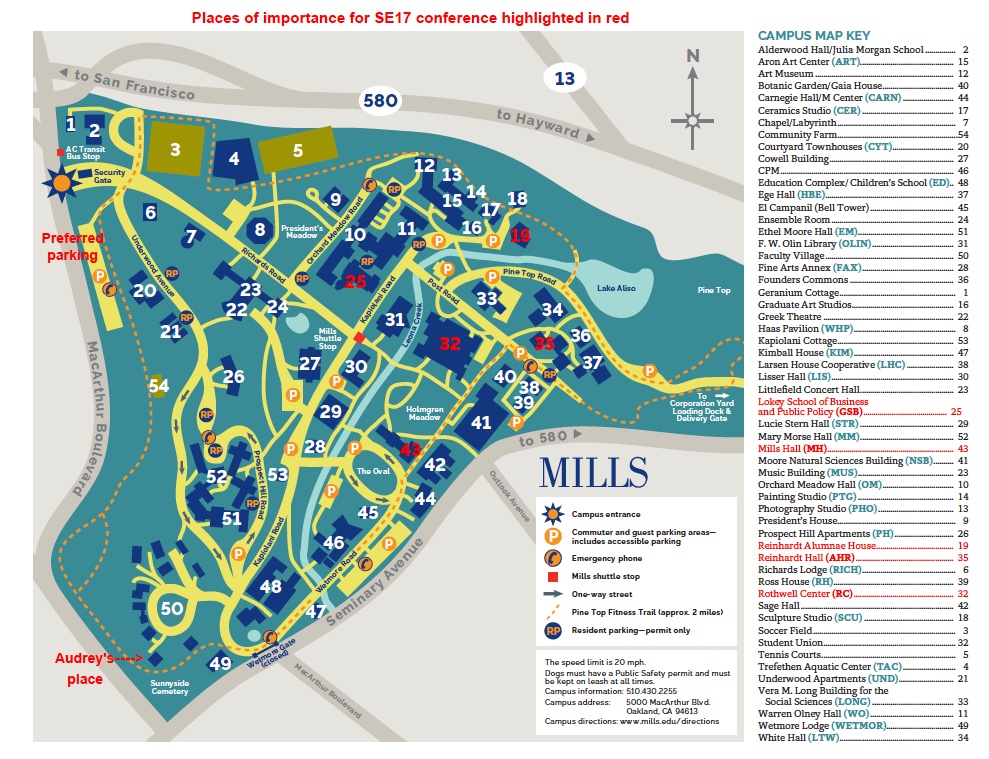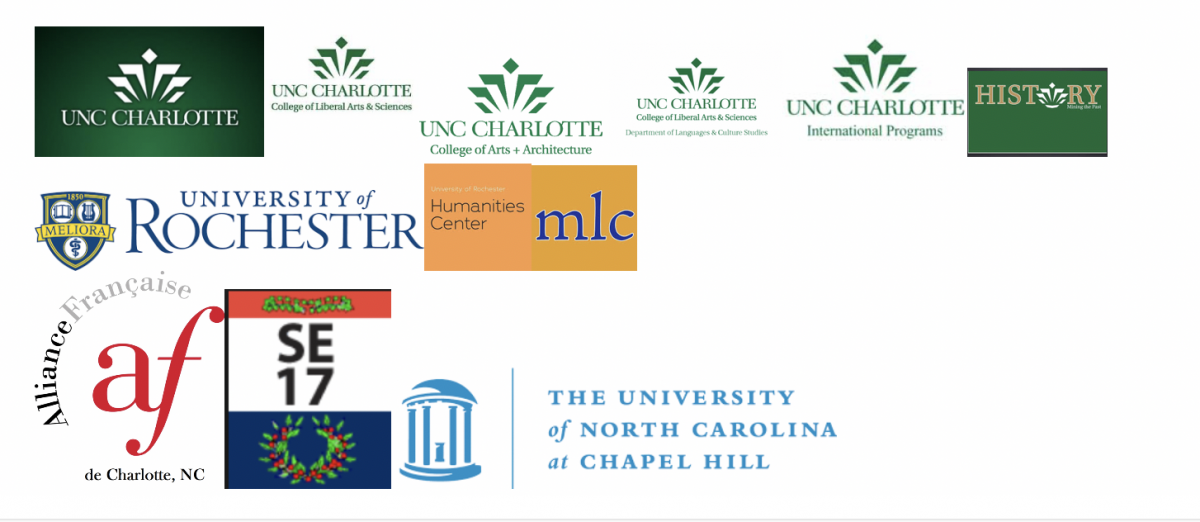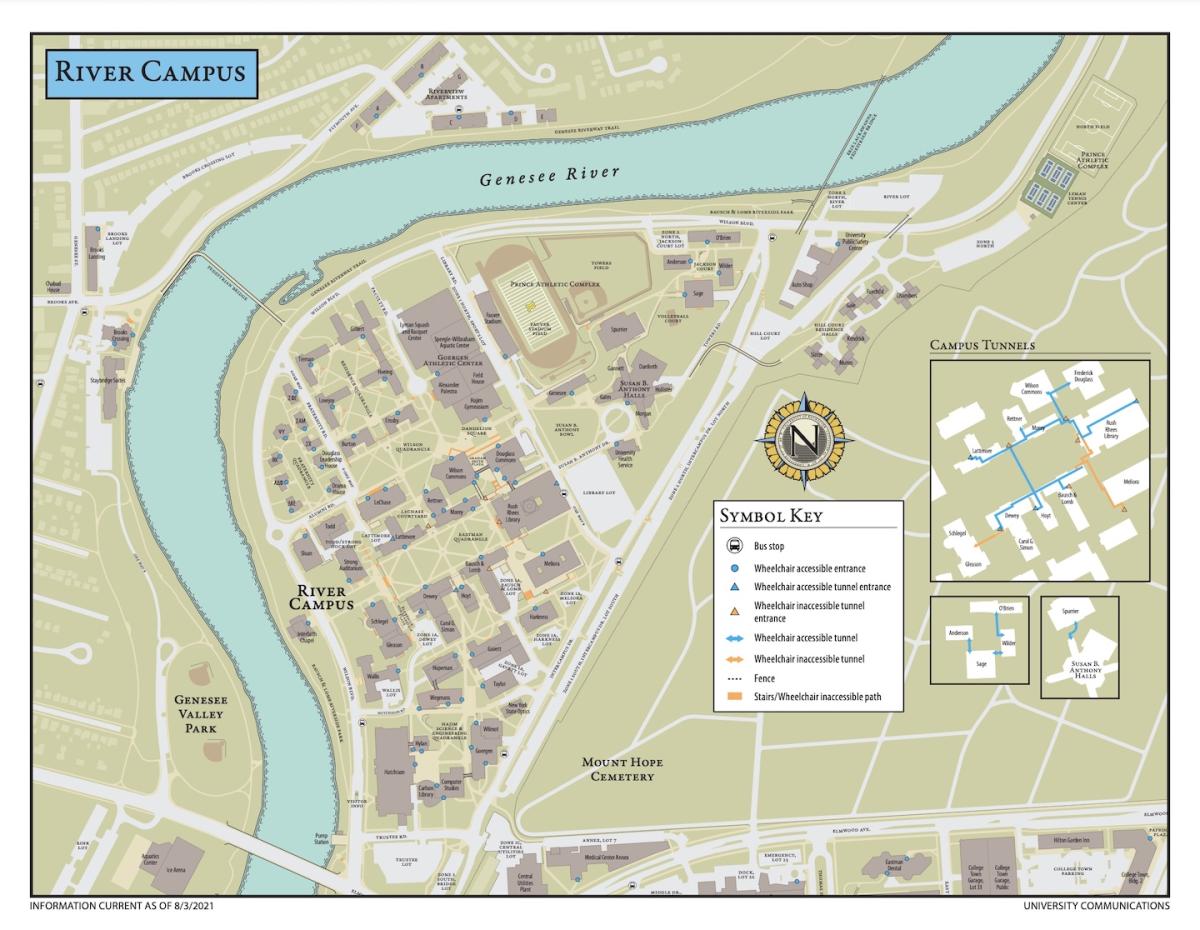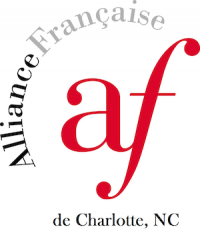eSE17 2020 - Program
Zoom links for all sessions will be provided to registrants at the following link prior to the conference. If you are not already logged in, please login at top right before attempting to view this content.
Session 1 (all times are in EST)
THURSDAY, OCTOBER 22
11:45AM Short Welcome & Gathering
Co-Presidents: Carrie F. Klaus (DePauw University) &
Kathrina A. LaPorta (New York University)
12:00PM - 1:00PM Roundtable: Teaching in a Time of Pandemic / Enseigner durant une
pandémie
Session Chairs: Anne L. Theobald (University of Wisconsin-Madison) and Ana F. Conboy (College of Saint Benedict and Saint John's University)
Amal Arrame (Université Abdelmalek Assaadi, Tanger),"Covid-19, une pandémie mondiale qui a changé le cours de vie de toute l'humanité"
Nicolas Hebbinckuys (University of Waterloo), "L’ancien et le moderne sans aucune querelle : Trois outils utiles pour enseigner dans le contexte à distance"
Hugh Roberts (University of Exeter), "Descartes through the Matrix and Other Thoughts on Teaching Online"
1:15PM - 2:30PM Roundtable: Race in Early Modern France I / Le concept de race
dans la France de la première modernité I
Session Chair: Nick Jones (Bucknell University), Organized by Mélanie Lamotte (Stanford University) & Nick Jones (Bucknell University)
Twyla Meding (West Virginia University), “Appetites Gone Wild:
Translating Gender and Blackness in Paul Scarron’s La Précaution inutile”
Ann T. Delehanty (Reed College), "Liminality, Religion, and Race in
Zayde: the Curious Cases of Félime and Zayde"
Anthony Saudrais (Institut Catholique de Vendée), “Qu’est-ce qu’être un(e) ‘sauvage’? L’exemple du ballet de cour du temps de Benserade et de Quinault”
Jolene Vos-Camy (Calvin University), “Slavery, Turks, and the Bourgeois
gentilhomme”
Jennifer E. Row (University of Minnesota, Minneapolis), “Akimbo: an
Attachment Genealogy of Race, Gender and Dissent”
2:45PM - 3:45PM Session Launch: Inclusive and Antiracist Syllabus Creation Project
Session Organizer: Ashley Williard (University of South Carolina)
This asynchronous project will involve collaboration on an inclusive and antiracist syllabus for a survey course in pre-/early modern French and Francophone history, literature, and culture. Following this initial brainstorming and launch meeting, participants will contribute to a shared Google Doc over the two-week period between synchronous conference sessions. The general goal, to be adjusted according to participant interest and ideas, is to create a series of open-source assignments and content modules that can be remixed for different sorts of courses. A concluding session will take place on Saturday, November 7.
4:00PM - 5:00 PM Apéro & Salon Games
FRIDAY, OCTOBER 23
11:30AM - 1:30PM Executive Committee Meeting
Members of the Executive Committee are welcome to eat breakfast, lunch, or dinner, according to their time zone.
1:45PM - 3:00PM Roundtable: Confinement / Le confinement
Session Chairs: Ann Delehanty (Reed College) and Abby Zanger
(Independent Scholar)
Haley Bowen (University of Michigan), "Convents and Confinement: Interrogating Alternative Spaces of Incarceration"
Anna-Lisa Nicholson (University of Cambridge), "'Cloyster up fulsome Mazarine': Hortense Mancini in England"
Adele Kudish (Borough of Manhattan Community College, CUNY), “‘Dans une Retraite […] [la] Plus [Austère]’: Confinement in Lafayette’s La Princesse de Clèves"
Hall Bjørnstad (Indiana University), “'[S]avoir demeurer chez soi avec plaisir’ with Pascal”
Nicholas Paige (University of California, Berkeley), "Foucault, Molière, and the Great Confinement”
Comment by Ellen McClure (University of Illinois, Chicago)
3:15PM - 4:15 PM Roundtable: Social Responsibility and Care Work / La responsabilité sociale et les soins de gardiennage
Session Chairs: Faith Beasley (Dartmouth College) & Deborah Steinberger (University of Delaware)
Ioana Manea (New Europe College, Göttingen/NEC Bucharest), "La charité des Turcs dans la Relation d’un voyage fait au Levant par Jean de Thévenot "
Edward J. Gray (École des chartes), "Poor Relief without the Poor: The Rhetoric of Poor Relief among the Marillac"
Carol Baxter (Trinity College Dublin), "Care as Patronage: Subverting the
Caregiver Role "
Therese Banks (Harvard University), "Witnessing spectacular violence: the role of the reader in Jean-Pierre Camus’s Les spectacles d’horreur (1630)"
4:30PM - 5:30PM Early Modern Music Concert: Bewitched
The Cleveland-based early music ensemble Les Délices will provide a special streaming concert for SE17 attendees. The concert, devoted to French composers who gave voice to Circe and Medea, features works by Marc-Antoine Charpentier, Louis-Nicolas Clérambault, and François Colin de Blamont. It will be followed by a Q&A with the musicians.
5:30PM - 6:00PM Q&A with Members of Les Délices
Session moderated by Rose Pruiksma (University of New Hampshire)
SATURDAY, OCTOBER 24
2:00PM - 4:00PM Free Virtual Performance of Molière's The School For Wives
Watch a Free Virtual Performance of The School For Wives by Molière in the Park, to be followed by an open discussion led by Claire Goldstein (University of California, Davis) over Zoom. The play will be performed in English, with closed captioning in English & French. Further details can be found here.
Session 2 (all times are in EST)
FRIDAY, NOVEMBER 6
11:45AM Short Welcome & Gathering
Co-Presidents: Carrie F. Klaus (DePauw University) &
Kathrina A. LaPorta (New York University)
12:00PM - 1:15PM Roundtable: Political Divisions / Les divisions politiques
Session Chairs: Christophe Schuwey (Yale University) & Toby Wikström
(University of Iceland)
Emma Claussen (University of Cambridge), “Divided Politics”
Andrea Frisch (University of Maryland), “The Politics of the Memorable”
Kirsteen M. MacKenzie (Independent Scholar), “From Foes to Friends: The Construction and Deconstruction of Francophobia in Cromwellian England (1649-1660)”
Chloé Hogg (University of Pittsburgh), “Early Modern Acts of Cleaving”
Deborah Steinberger (University of Delaware), “Sowing Political Division through Fake News”
Katherine Ibbett (University of Oxford), “Looking across the Divide”
1:30PM - 2:45PM Roundtable: Epidemic / Plague - Peste / Épidémies
Session Chairs: Nathalie Freidel & Michèle Rosellini)
Didier Foucault (Université Toulouse – Jean Jaurès): “Flambées et disparition de la peste en Europe au XVIIe siècle”
Ariane Bayle (Université Jean Moulin – Lyon 3): “Présentation de l’anthologie Le Siècle des vérolés (2019)”
Yves Le Pestipon (Académie des sciences et belles-lettres de Toulouse): “Les animaux dans la Peste : que de mal, que de mots !”
Julien Perrier-Chartrand (Université Concordia, Montréal): “Le duel clandestin de point d’honneur ou une “peste ambulatoire” sous l’Ancien Régime”
Perry Gethner (Oklahoma State University): “Staging a Pandemic: Show or Tell?”
3:00PM - 4:15 PM Reading Group 1: Getting to Race in Early Modern Studies
Organized by Craig Koslofsky (University of Illinois, Urbana-Champaign)
4:30PM - 5:30PM Apéro & Trivia
SATURDAY, NOVEMBER 7
12:00PM - 1:30PM Business Meeting
All conference attendees are SE17 members and are welcome and encouraged to attend. Please come honor our prize-winning graduate students and lend your voice to important discussions of SE17's ongoing and future initiatives.
1:45PM - 2:45PM Roundtable: Race in Early Modern France II / Le concept de race
dans la France de la première modernité II
Session Chair: Mélanie Lamotte (Stanford University), Organized by Mélanie Lamotte (Stanford University) & Nick Jones (Bucknell University)
Toby Erik Wikström (University of Iceland),” Always Already There?
Searching for the Origins of Race in Early Modern France”
Craig Koslofsky (University of Illinois), “Beyond Bernier: race in Fontenelle's Entretiens sur la pluralité des mondes and other popular late seventeenth-century works”
Katherine Dauge-Roth (Bowdoin College), “Early Debates about Skin Color at Théophraste Renaudot’s Bureau d’adresse et de rencontre”
Mathilde Mougin (Aix-Marseille Université), “Les voyageurs du XVIIe
siècle: des encyclopédistes du genre humain?”
3:00PM - 4:00PM Inclusive and Antiracist Syllabus Creation Project Concluding Session
Session Organizer: Ashley Williard (University of South Carolina)
4:15PM - 5:30PM Reading Group 2: Confined Characters: Unity of Place in French
Neo-Classical Theater
Organized by Esther Van Dyke (University of Chicago), Amine Bouhayat (University of Chicago), & Peadar Kavanagh (University of Chicago)
5:30PM - 6:15PM Apéro & Closing Social Event
Works in Progress/Travaux en cours
Group(e) 1
Dana Nica (Université Alexandru Ioan Cuza-Université de Lorraine) “‘Anéantissez cette vigueur pour mon salut’: Dire la maladie, diversion, inversion, conversion chez Pascal”
Radhika Koul (Stanford University) “Affective Deliberations:Rasaand the Sublime”
Ellen Welch (University of North Carolina Chapel Hill) “Sévigné’s Social Soundscapes”
Jennifer Row (University of Minnesota) “Intellectual Disability, Feminist Agency and Sexual Desire in Riquet à la houppe”
Group(e) 2
Benjamin Bernard (Princeton University) “The Ethics of Male Friendship at the Royal Chapel”
Matthieu Dupas (Northwestern University) sur le style galant comme esthétique de l'existence dansMélitede Corneille
Daniel J. Worden (Furman University) “Impostors and Projectors in French Fiction, 1650-1720”







